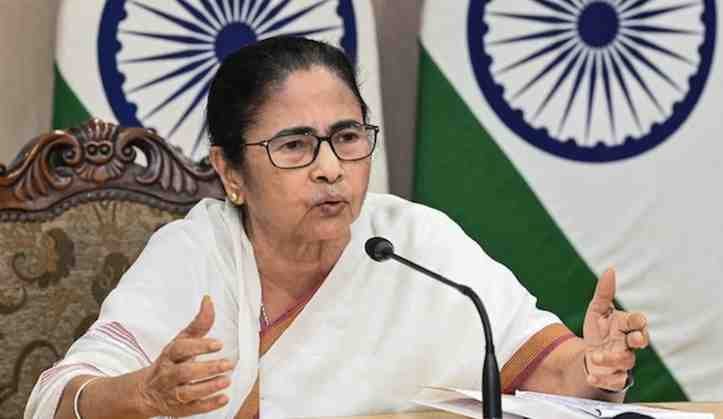Language Row Sparks Political Storm Between Mamata Banerjee and BJP
A political firestorm has erupted after a letter from the Delhi Police referred to the Bengali language as “Bangladeshi,” prompting a furious backlash from West Bengal Chief Minister Mamata Banerjee and her party, the Trinamool Congress. The controversy unfolded over the weekend and escalated sharply by Monday, with both the Trinamool and BJP trading sharp barbs in a deepening cultural and political clash.
At the heart of the dispute is a letter written by Delhi Police in connection with an investigation under the Foreigners Act. The letter, reportedly sent to the officer-in-charge of Banga Bhawan—West Bengal’s guest house in Delhi—used the term “Bangladeshi language” when referring to a translation requirement. This phrasing triggered an immediate response from Mamata Banerjee, who took to X (formerly Twitter) on Sunday to condemn what she called an “anti-national and unconstitutional” action. She asserted that such language “insults all Bengali-speaking people of India” and accused Delhi Police of degrading a constitutionally recognized language.
Trinamool Condemns “Xenophobic” Intent
The Trinamool Congress issued a strongly worded statement accusing the BJP and its allied institutions of promoting a culture of exclusion and “systematic xenophobia.” The party argued that referring to Bengali as “Bangladeshi” was part of a broader effort to “other” Bengali-speaking Indians, particularly migrants and workers. “Such dangerous narratives must be condemned and resisted at every level,” the party declared, calling it a deliberate targeting of Bengali identity under the guise of national security.
In response, BJP IT cell chief Amit Malviya fired back with an X post of his own, calling Mamata Banerjee’s statements “dangerously inflammatory.” He insisted the Delhi Police had not labeled Bengali as “Bangladeshi,” but had merely used the term in the context of identifying linguistic traits common among illegal immigrants from Bangladesh. Malviya argued that the reference was meant to distinguish certain dialects—like Sylheti—which are widely spoken in parts of Bangladesh but are significantly different from the Bengali spoken in Indian states like West Bengal.
“There is, in fact, no single language that encompasses all dialects labeled as Bengali,” Malviya wrote. “The phrase ‘Bangladeshi language’ is used as a shorthand to describe linguistic indicators that help in profiling suspected infiltrators.”
Mamata Banerjee’s reaction to Delhi Police referring to the language used by infiltrators as ‘Bangladeshi’ is not just misplaced, it is dangerously inflammatory.
Nowhere in the Delhi Police letter is Bangla or Bengali described as a ‘Bangladeshi’ language. To claim otherwise and… https://t.co/Ynb5o8cT6n
— Amit Malviya (@amitmalviya) August 4, 2025
Backlash Against Linguistic Generalisation
However, the BJP’s justification did little to calm tensions. Trinamool leaders dismissed Malviya’s defense as “linguistic apartheid,” arguing that reducing a diverse and constitutionally recognized language to a tool for profiling was discriminatory and offensive. They emphasized that Bengali is not just an ethnicity but a vibrant, unified linguistic identity shared by millions in India.
Critics have pointed out that this controversy taps into deeper anxieties in Bengal politics, particularly regarding the treatment of migrants, cultural identity, and the growing polarisation over language and citizenship. With past debates around the NRC (National Register of Citizens) and CAA (Citizenship Amendment Act) still fresh, this episode has reignited fears of marginalisation among Bengali-speaking populations.
Letter Linked to Foreigners Act Case
The letter in question was related to an ongoing investigation under the Foreigners Act and sought assistance from officials at Banga Bhawan. While Delhi Police has not released an official statement clarifying its language choice, the backlash suggests that the damage has already been done.
Opposition parties have rallied behind the Trinamool’s stance, demanding an official apology and a retraction of the language used in the police communication. Civil society groups and linguistic activists have also expressed concern about the implications of such terminology for India’s multicultural federal structure.
A Broader Cultural Battle Ahead
As the controversy shows no signs of slowing down, political observers believe this incident may become a major flashpoint in the coming months, especially with elections on the horizon in several states. For Mamata Banerjee, known for her fiery brand of regional politics, the issue presents an opportunity to consolidate support among Bengali-speaking voters by framing the BJP as antagonistic to their identity.
The BJP, meanwhile, appears determined to frame the debate as one of national security versus identity politics. Whether this strategy will resonate with the electorate remains to be seen, but for now, the row has once again thrust questions of language, citizenship, and cultural respect into the national spotlight.








